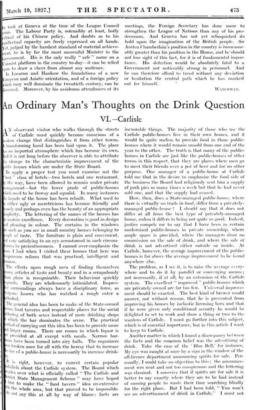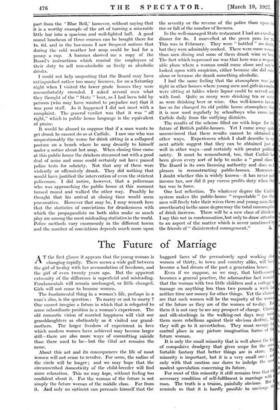Ordinary Man's Thoughts on the Drink Question
VI. —Carlisle
observant visitor who walks through the streets of Carlisle must quickly become conscious of a Wan change that distinguishes it from other towns. transforming hand has been laid upon it. The place • s an imported atmosphere which has become its own. id it is not long before the observer is able to attribute e change to the characteristic improvement of the ablie houses which are under the State Board.
To apply a proper test you must examine not the best " class of hotels—two hotels and one restaurant, y the way, have been allowed to remain under private. anagement—but the lower grade of public-houses hieh used to be frowsy and squalid. In many instances e façade of the house has been rebuilt. What used to either ugly or meretricious has become friendly and onuly and perhaps even has the beauty of an appropriate iplieity. The lettering of the names of the houses has austere excellence. • Every decoration is good in design id pleasing in colour. The curtains in the windows such as you sec in small country houses belonging to ople of taste. The furniture is plain and convenient, it very satisfying to an eye accustomed in such eircum- ances to pretentiousness. I cannot Over-emphasize the use I had when I visited these houses that here "was mperance reform that was practical, intelligent and mane.
The effects upon rough men of finding themselves long articles of taste and beauty and in a scrupulously an place is recognizable. Their behaviour quickly spends. They are wholesomely intimidated. Impres- e surroundings always have a disciplinary force, as eryone knows who has watched a rough enter a thedral. - The general idea has been to make of the State-owned Nes food taverns and respectable places for the social hexing of both sexes instead of mere drinking shops Which the bar dominates the scene. The practical ethod of carrying out this idea has been to provide more 1 larger rooms. There are rooms in which liquor is t provided at all except with. meals. Narrow har- ms have been turned into airy halls. The organizers ve broken once for all with the heresy that to increase size of a public-house is necessarily to increase drink- It is right, however, to correct certain popular isbeliefs about the Carlisle system. The Board which elides over what is officially called " The Carlisle and strict State Management Scheme " • may have hoped first to make the "food tavern " idea co-extensive h the whole area, but that proved. to be impossible. do not say this at all- by way of • blame; facts are inexorable things. The majority of those who use the Carlisle public-houses live in their own homes, and it would be quite useless to provide food in those public- houses where it would remain unsold from one end of the year to the other. The truth is that many of the public- houses in Carlisle are just like the public-houses of other towns in this respect, that they are places where men go to meet their friends over a pot of beer and for no other purpose. One manager of a public-house at Carlisle told me that in the desire to emphasize the food side of the business the Board had religiously sent him a supply of pork pies so many times a week but that lie had never sold one, and that the supply had ceased.
How, then, does a State-managed public-house, where there is virtually no trade in food, differ from a privately- managed public-house ? I should say that it does not differ at all from the best type of privately-managed house, unless it differs in being not quite so good. Indeed, justice compels me to say that I have been in certain modernized public-houses in private ownership, where_ ample space is provided, where the managers draw no commission on the sale of drink, and where the sale of drink is not advertised either outside or inside. At Carlisle, however, the average improvement of the public- houses is far above the average improvement to be found anywhere else.
The problem, as I see it, is to raise the average every- where and to do it by parallel or converging means ; not necessarily, if at all, by an extension of the Carlisle system. The excellent " improved " public-houses which are privately owned are far too few. Universal improve- ment should be exacted. The best kind of brewer would' answer, not without reason, that he is prevented from improving his houses by inelastic licensing laws and that if he were given only conditional security he would be delighted to set to work and show a thing or two to the wardens of Carlisle. I must go further into this subject, which is of essential importance, but in this article I want to keep to Carlisle.
Another matter in which I found a discrepancy between the facts and the common belief was the advertising of drink. Take the case of the ' Blue Bell,' for instance. My eye was caught at once by a sign in the window of the off-licence department announcing spirits for sale. Per- sonally, I could take no objection to this ; the announce- ment was neat and not too conspicuous and the lettering was classical. I conceive that if spirits are for sale it is better to say exactly where they are to be had instead of causing people to waste their time "searching blindly for the right place. But I had been told, " You won't see an advertisement of drink in Carlisle." I must not part from the ' Blue Bell,' however, without saying that it is a worthy example of the art of turning a miserable little bar into a. spacious and well-lighted hall. A good sound luncheon of three courses can be bought there for ls. 6d. and in the bar-room I saw frequent notices that during the cold weather hot soup could be had for a penny a cup. A barman showed me a copy of the Board's instructions which remind the employees of their duty to sell non-alcoholic as freely as alcoholic drinks.
I could not help suspecting that the Board may have extinguished rather too many licences, for on a Saturday night when I visited the lower grade houses they were uncomfortably crowded. I asked several men what they thought of the " State" beer, as I had been told by persons (who may have wanted to prejudice me) that it Was poor stuff. As it happened I did not meet with a complaint. The general verdict was that it was " all right," which in public house language is the equivalent of praise.
It would be absurd to suppose that if a man wants to get drunk he cannot do so at Carlisle. I saw one who was unquestionably the worse for drink sitting in a collapsed posture on a bench where he sang drearily to himself under a notice about hot soup. When closing time came at this public house the drinkers streamed out with a good deal of noise and some could certainly not have passed police tests for sobriety. Not that any of them were violently or offensively drunk. They did nothing that would have justified the intervention of even the strictest policeman. I did notice, however, that a policeman who was approaching the public house at this moment turned round and walked the other way. Possibly he thought that his arrival at closing time would seem provocative. However that may be, I may remark here that the statistics of convictions for drunkenness with which the propagandists on both sides make so much play are among the most misleading statistics in the world. Police methods vary enormously in the different towns and the number of convictions depends much more upon the severity or the reverse of the police than upon rise or fall of the number of licences.
In the well-managed State restaurant I had an excellent dinner. for 3s.. I marvelled at the green peas for 2 This was in February. They were " bottled " no doubt but they were admirably cooked. There were more word( than men dining and some of them drank wine or beer The fact which impressed me was that here was a respect able place where a woman could come alone and not I looked upon with suspicion, either because she did come alone or because she drank something alcoholic.
I had the same feeling that the atmosphere was ju, right in other houses where young men and girls in coup were sitting at tables where liquor could be served only with food. Quite as many were drinking tea. or watt: as were drinking beer or wine. One well-known tavern has so far changed its old public house atmosphere it is now used regularly by schoolboys who come in: Carlisle daily from the outlying districts.
The results of the scheme filled me with hope for t future of British public-houses. Yet I came away (pit unconvinced that these results cannot be obtained i other ways. Experiences which I shall describe in nr, next article suggest that they can he obtained just a well in other ways—and certainly with greater politico safety. It must be remembered, too, that Carlisle ba been given every sort of help to make a " good show: The Board is its own licensing authority and does as i pleases in reconstructing public-houses. Moreover I doubt whether this is widely known—it has never pal! income tax, nor did it pay excess profits duty when tha tax was in force.
One last reflection. To whatever degree the Carli4 system makes the public-house " respectable " (so Ilia men will freely take their wives there and young men thei sweethearts) to the same degree may the total consumptio of drink increase. There will be a new class of drinke I say this not in condemnation, but only to draw attentio to an aspect of the matter which is never mentioned b the friends of " disinterested management." A.































































 Previous page
Previous page